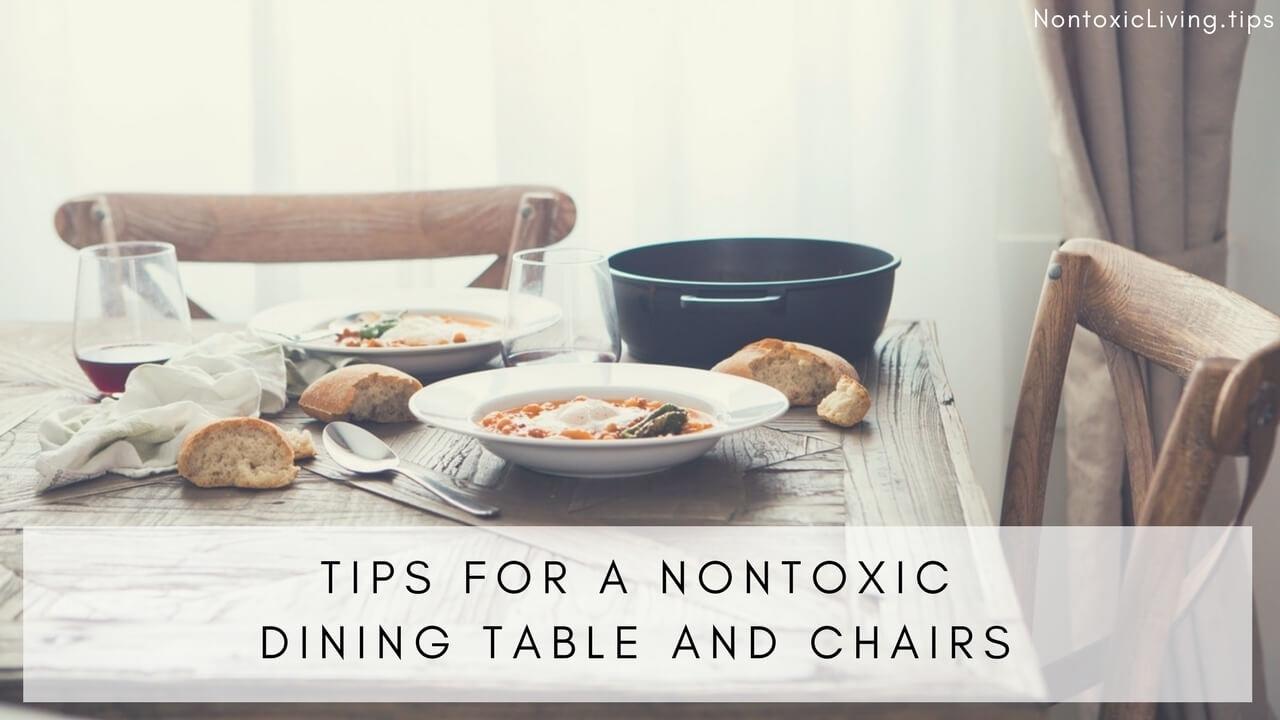
Tips for a Nontoxic Dining Table and Chairs
Mar 13, 2018by Angela Cummings and Sophia Ruan Gushée
We use our kitchen dining table daily to gather for a quick breakfast, family meals, and (let’s be honest) to hold the mail pile.
It’s a centerpiece of the kitchen or dining room utilized by the entire family.
The type of dining table, and accompanying chairs, that are used are the main furniture pieces in our homes that can be harmful to health.
What Factors Are Important to Consider?
When choosing a nontoxic dining table and chairs, there are four main factors to consider.
Each of these factors directly affects the amounts of volatile organic compounds (VOCs), semi-organic volatile organic compounds (SVOCs) and hazardous air pollutants (HAPs) that are off-gassed or released into the home. These chemicals, often found in standard furniture, have been linked to health conditions—like headaches, dizziness, nervous system damage, kidney or liver damage, cancer, birth defects, and reproductive abnormalities. (1)(2)
It’s also important to consider the electrical magnetic fields (EMF) that are amplified by metal products. EMFs have been linked to cancer. (3)
1. Material. The table and chairs can be made from wood, metal, glass, and plastics. The type of wood used is something we should also consider: Is the wood a composite wood (laminated wood, made with plastic resins) or is it a solid wood product? Is the solid wood a softwood—such as pine or cedar—that releases higher amounts of natural VOCs, or a hardwood—such as a maple or oak—that releases lower amounts of natural VOCs?
2. Glues & Adhesives. Table and chair parts, like all furniture, are held together with glues and adhesives. Joints—such as dovetail or strengthened with doweling—use glues that reinforce the strength of the joint.
3. Stains, Paints & Finishes. Wood furniture is typically pre-finished, or factory finished, using stains, paints, and finishes that have higher VOCs. Some furniture manufacturers and retail stores sell unfinished furniture, allowing you to finish it with the zero-VOC product of your choice.
4. EMFs. Certain materials, such as metal, are conductors of electricity. They can amplify the magnetic fields in the home that are created by typical electrical wiring (lights, light switches, furnace), computers and electronic devices, televisions, refrigerators and other household items that generate an electrical field when plugged in or in use.
What Kind of Dining Table Should We Use?
While each type of furniture has its pros and cons, the bottom line is this: the best type of dining table, and accompanying chairs, to use is one of two options: solid hardwood with a zero-VOC finish, or metal frame with a glass top.
- Solid Hardwood with Nontoxic Finishes & Glues. Consider buying a solid hardwood dining table made of materials such as maple, oak, walnut, or cherry. Not only do hardwoods naturally off-gas fewer VOCs, but they are also a stronger material.
- If glues and adhesives are needed, opt for furniture manufactured by companies using zero- or low-VOC products.
- Choose tables and chairs finished with natural finishes such as linseed oil or beeswax or finished with zero-VOC stains and finishes.
- Or opt for unfinished tables and chairs, and finish them yourself with a zero-VOC stain and finish of your choosing.
- Metal with Glass Top. Metal tables with glass tops are another healthier option for a dining table. During manufacturing, oils are used to form the metal portion of the table. However, these oils can easily be wiped off with rubbing alcohol or dish detergent. Consider purchasing a metal table with baked-on paint. In order for the paint to adhere, the manufacturing oils are removed during production. One less step for you! Plus, it adds to the table’s decoration. Glass is widely accepted as a healthier material, so that’s an easy “check” on the nontoxic material list for dining tables.
What Kind of Chairs are Healthier?
Chairs should also be solid hardwood with zero-VOC finish and adhesives, and metal, following the advice above. However, some table sets come with cushioned chairs. Below are two additional tips for choosing dining chairs.
- Non-Cushioned Chairs. Typically, dining chairs are made from the same material and finish as the dining table. However, there are table and chair sets that come with cushioned metal or cushioned wood chairs. Consider buying chairs that are hard-surface (made from metal or solid hardwood and finished similar to the table).
- Natural Rubber-Filled Chairs. If you're looking for cushioning or padding on your chairs, choose chairs filled with natural organic rubber or organic wool. Opt for coverings made with organic and natural materials—such as organic cotton or wool. Be sure to choose coverings with natural dyes and finishes, as well.
In Summary
Dining tables and chairs are used every day, multiple times a day, by the entire family. When choosing a nontoxic dining table, and accompanying chair set, consider the type of material it’s made from, glues and adhesives used, finishes, and padding (in and on chairs).
Dining tables made with solid hardwood, zero-VOC glues and adhesives, and zero-VOC finishes are one of the best options. There are manufacturers that offer unfinished dining table and chair sets, and you can finish yourself with the zero-VOC finish of your choice.
Dining tables made from metal and a glass top are another nontoxic option to consider. Opt for metal with baked-on paint to reduce the number of manufacturing oils and increase the decorative properties.
Chairs are often part of the dining set and are made with similar materials, glues, and finishes as the table. In instances where the chairs are padded, opt for fillings and coverings made from natural materials, such as natural rubber or wool filling and natural cotton covering.
References



